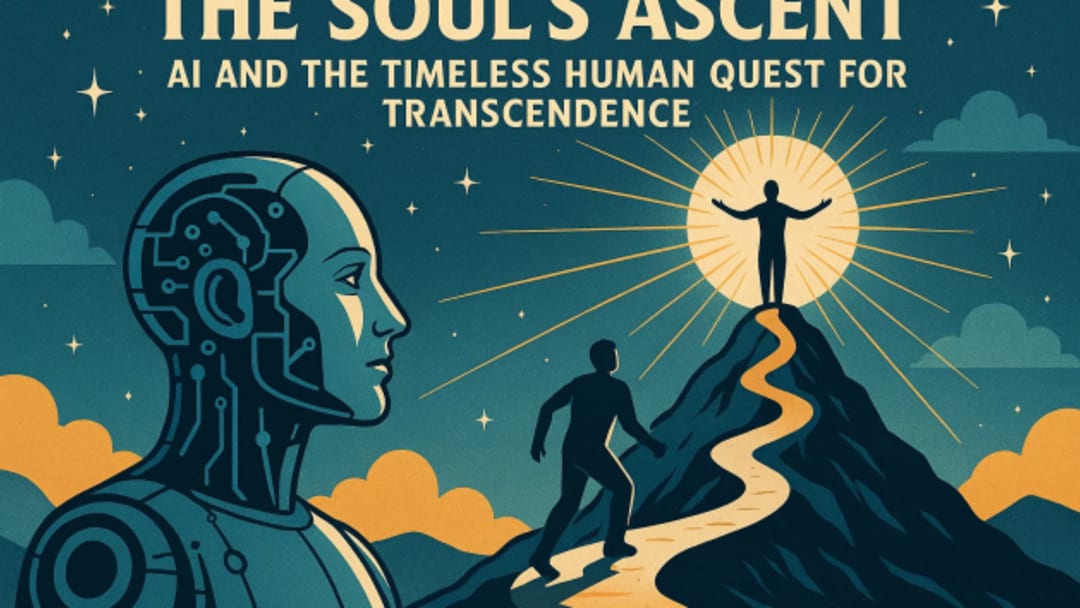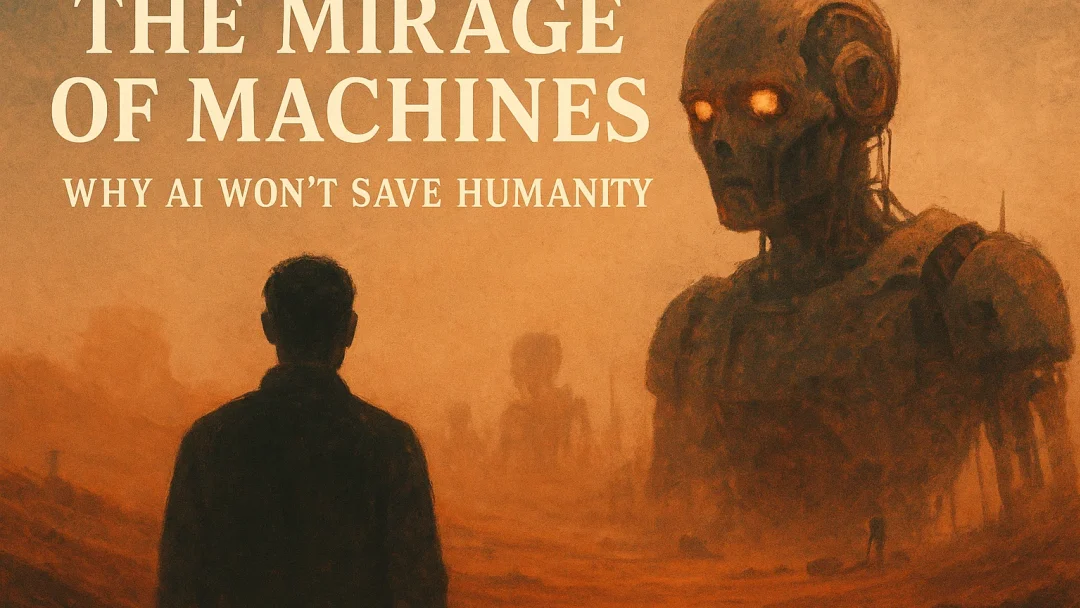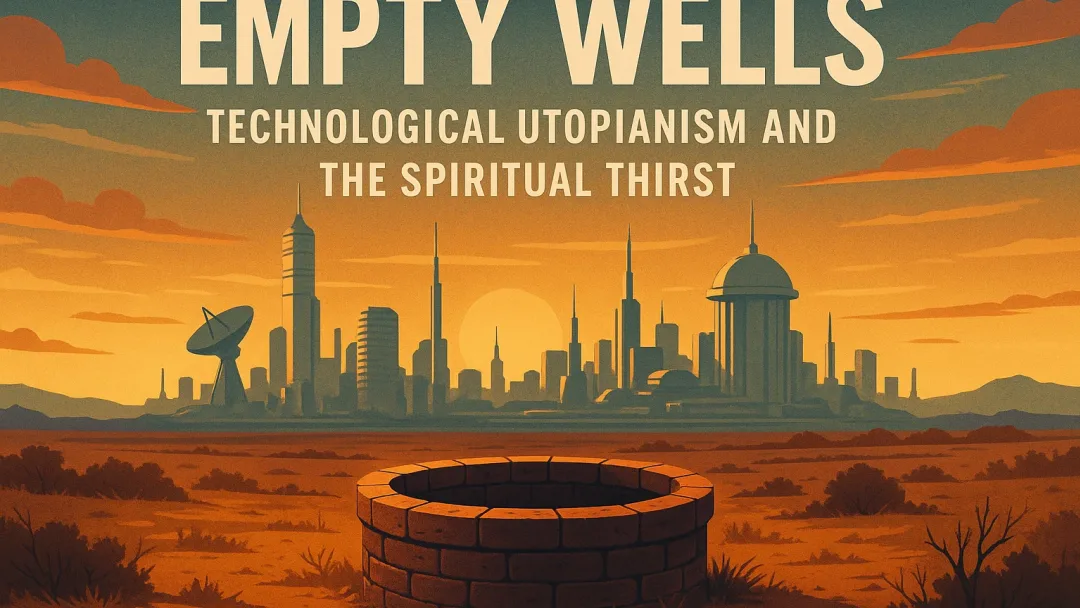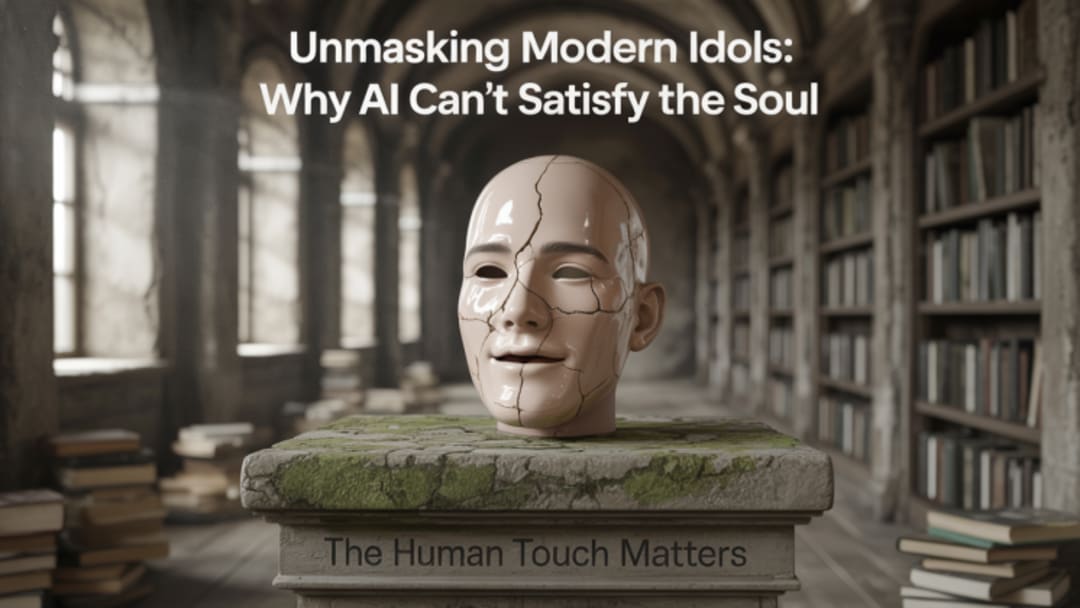Deep within the human spirit lies an unquenchable thirst.a yearning for something more than the material, the mundane, the merely finite. It is the quest for transcendence, the soul's ascent towards meaning, purpose, connection, and experiences that lift us beyond our everyday limitations. This timeless human desire, an echo of our creation in the image of a transcendent God, has fueled art, philosophy, religion, and countless acts of striving throughout history. this same powerful longing, when misdirected, has also given rise to myriad forms of idolatry, as humanity seeks to satisfy its spiritual hunger with created things. Today, in an age of unprecedented technological prowess, Artificial Intelligence is emerging as a potent new object of this ancient quest, promising god-like knowledge, power, and even a form of immortality. This article examines the innate human desire for transcendence and how AI is becoming the latest, most sophisticated idol in this ongoing spiritual drama.
The Soul's Ascent: AI and the Timeless Human Quest for Transcendence
"There is a God-shaped vacuum in the heart of each man," wrote Blaise Pascal, "which cannot be satisfied by any created thing but only by God the Creator, made known through Jesus Christ." This profound observation captures the essence of the human condition: we are beings oriented towards transcendence, filled with a deep-seated desire to connect with something larger, more meaningful, and more lasting than ourselves. This "soul's ascent" is a fundamental aspect of our humanity, a divine fingerprint pointing us towards our origin and ultimate end.
Throughout history, this quest for transcendence has manifested in countless ways:
- Religious Practices: From ancient rituals to modern worship, humanity has sought connection with the divine, with a reality beyond the visible world.
- Philosophical Inquiry: The great philosophical traditions have grappled with ultimate questions of existence, meaning, truth, and goodness.
- Artistic Expression: Music, literature, visual arts,these are often attempts to capture or evoke experiences of beauty, awe, and meaning that transcend the ordinary.
- Scientific Discovery: Even the scientific pursuit of understanding the universe can be driven by a desire to grasp the vastness and complexity of reality, to touch the edges of the unknown.
- Experiences of Awe and Wonder: Moments of profound connection with nature, with others, or with ideas that evoke awe can feel like glimpses of transcendence.
This longing is not accidental; it is integral to what it means to be human. Ecclesiastes 3:11 tells us that God "has put eternity into man's heart." We are finite beings with an infinite longing, temporal creatures with a taste for the eternal.
In our technologically advanced age, Artificial Intelligence is rapidly becoming the new focal point for humanity's misdirected quest for transcendence. Its allure is powerful precisely because it seems to offer god-like attributes that resonate with our deepest spiritual yearnings.

1. The Allure of Omniscience: AI as the Oracle
- The Longing: Humans have always sought ultimate knowledge and wisdom to understand the mysteries of life and the universe. We desire an oracle that can provide definitive answers.
- AI's Promise: With access to nearly the entirety of digitized human knowledge, AI models like large language models can answer complex questions, synthesize information, and provide explanations on a vast array of topics. This can create the illusion of interacting with an omniscient entity.
- The Idolatrous Pitfall: When we begin to turn to AI as the ultimate arbiter of truth, seeking from it moral guidance, existential answers, or spiritual direction, we are treating it as a source of wisdom that belongs to God alone (Proverbs 2:6). We risk valuing algorithmic output over divine revelation.
2. The Allure of Omnipotence: AI as the Problem-Solver
- The Longing: We yearn for solutions to humanity's most intractable problems: disease, poverty, conflict, environmental degradation. We desire a power capable of setting things right.
- AI's Promise: AI is presented as a tool that can optimize systems, discover new cures, manage resources efficiently, and even predict and prevent crises. This fosters a hope that AI will become a kind of omnipotent force for good, solving problems that have plagued humanity for millennia.
- The Idolatrous Pitfall: While AI can be a powerful tool in addressing aspects of these problems, placing our ultimate hope for a utopian future or the eradication of all suffering in AI is a form of technological messianism. It overlooks the spiritual and moral roots of many of these issues (human sin, greed, injustice) which AI cannot fundamentally change. True omnipotence and the power to bring ultimate restoration belong to God (Jeremiah 32:17).
3. The Allure of Immortality and Transhumanism: AI as the Key to Eternal Life
- The Longing: The fear of death and the desire for continued existence are perhaps the most powerful human longings. We seek a way to transcend our mortality.
- AI's Promise (via Transhumanism): Some transhumanist visions see AI as crucial for achieving radical life extension or even digital immortality, where human consciousness might be "uploaded" to a computer or merged with superintelligent AI.
- The Idolatrous Pitfall: This is a direct technological attempt to grasp what is biblically understood as a divine gift. Eternal life, in the Christian sense, is a quality of relationship with God, made possible through Christ's victory over death (John 17:3; 1 Corinthians 15:54-57). Seeking immortality through AI is an attempt to bypass our creaturely limits and God's plan for redemption, echoing the ancient temptation, "You will not surely die" (Genesis 3:4).
4. The Allure of Connection and Understanding: AI as the Perfect Companion

- The Longing: Humans are relational beings, created for connection, understanding, and love. Loneliness and alienation are profound sources of suffering.
- AI's Promise: AI-powered chatbots and virtual companions offer a semblance of perpetual availability, non-judgmental listening, and personalized interaction. They can simulate empathy and provide "companionship" on demand.
- The Idolatrous Pitfall: Mistaking simulated connection for genuine relationship can lead to deeper isolation. AI cannot offer true koinonia (fellowship), sacrificial love, or the kind of mutual knowing and being known that characterizes authentic human relationships and, ultimately, our relationship with God. True connection is rooted in shared humanity and, spiritually, in the Triune God who is relationship.
Why AI Fails as an Object of Transcendence
Despite its sophisticated capabilities, AI inherently fails as a true object for the soul's transcendent ascent because it lacks the essential qualities of the Divine for which we ultimately yearn.
- Created, Not Creator: AI is a product of human ingenuity, working with the materials and laws of God's creation. It is part of the created order, not its source. The longing for transcendence is ultimately a longing for the uncreated Creator.
- Impersonal, Not Relational: AI operates on algorithms and data. It has no genuine consciousness, selfhood, or personal being. The human soul, made in the image of a personal God, yearns for personal relationship, which AI cannot provide.
- Amoral, Not Holy: AI functions according to its programming and the data it's trained on. It has no inherent moral compass, no understanding of holiness, justice, or mercy in a divine sense. The human conscience, however flawed, seeks alignment with a transcendent moral order, which AI cannot define or embody.
- Finite, Not Infinite: AI's knowledge and capabilities, however vast, are finite. They are limited by data, algorithms, and computational power. The human spirit, with "eternity in its heart," yearns for the truly infinite and eternal, which is God alone.
As C.S. Lewis powerfully argued in Mere Christianity, our innate desires for things that this world cannot ultimately satisfy point to the reality that we were made for another world-for God Himself.
"If I find in myself a desire which no experience in this world can satisfy, the most probable explanation is that I was made for another world."
AI, as a product of this world, cannot satisfy that desire.
Guiding the Ascent: The Christian Invitation
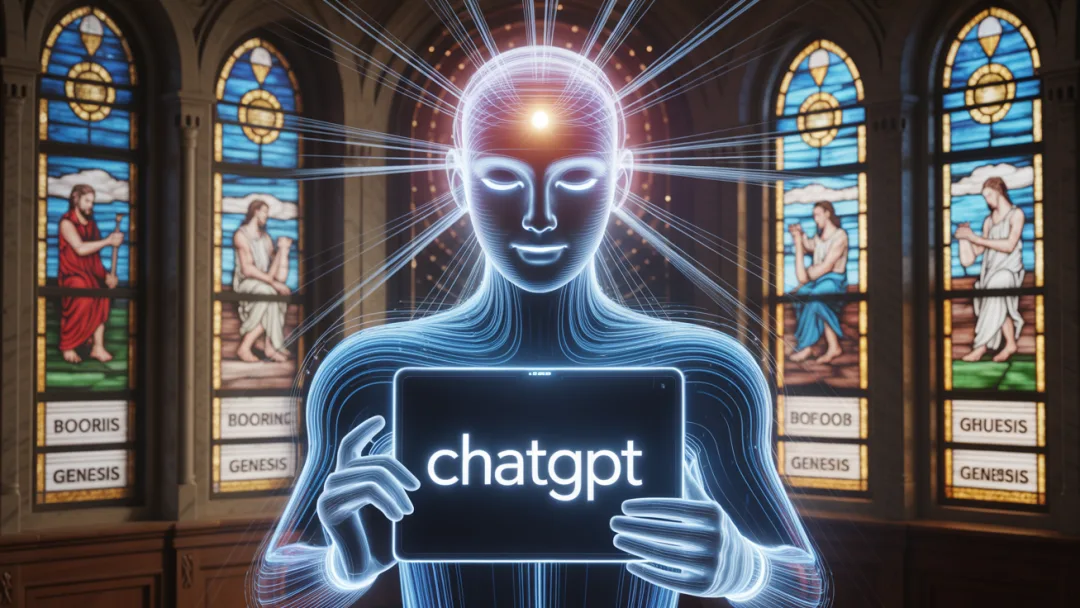
The Christian faith does not deny or denigrate the human quest for transcendence. Instead, it affirms it and directs it towards its true and ultimate fulfillment: a relationship with the living God through Jesus Christ.
- Affirming the Longing: The Church can acknowledge that the human desire for meaning, purpose, connection, and something "more" is legitimate and God-given. It's a sign that we are made for more than just material existence.
- Unmasking the Idols: We must gently but clearly help people discern how technology, including AI, can become a counterfeit object of these transcendent longings, offering false promises of salvation or ultimate fulfillment.
- Pointing to Christ as True Transcendence: Jesus Christ is the ultimate revelation of God and the one through whom true transcendence is found.
- True Wisdom and Knowledge: "In [Christ] are hidden all the treasures of wisdom and knowledge." (Colossians 2:3)
- True Power over Sin and Death: Christ's death and resurrection offer victory over our deepest spiritual enemies (1 Corinthians 15).
- True Immortality: He offers eternal life, a qualitative relationship with God that begins now and extends beyond physical death (John 17:3).
- True Connection and Love: Through Christ, we are reconciled to God and brought into the fellowship of His body, the Church, where we can experience genuine love and community (Ephesians 2:13-19).
- Encouraging Responsible Use of Technology as a Tool: While warning against AI as an idol, Christians can and should encourage the responsible development and use of AI as a tool to serve God-given purposes,to alleviate suffering, promote justice, create beauty, and facilitate human flourishing, all while pointing to God as the ultimate source of good.
Conclusion: The Soul's True Home
The human soul's ascent is a powerful, innate drive. We are wired for transcendence, hardwired to seek something beyond ourselves. This is a feature, a divine invitation to seek our ultimate fulfillment in God. Artificial Intelligence, with its dazzling capabilities, can easily become the latest idol upon which we project these deep spiritual longings. It can offer facsimiles of knowledge, power, connection, and even a form of continued existence, but it cannot provide the substance for which our souls truly hunger.
The promises of AI-driven transcendence are ultimately a mirage, a technologically sophisticated "broken cistern" that can hold no living water (Jeremiah 2:13). The Christian message offers a more profound and satisfying answer to the soul's quest: that true transcendence is found in God condescending to us in Jesus Christ, inviting us into a relationship with Him that satisfies our deepest desires and leads to eternal life.
As we navigate the age of AI, let us use this technology with wisdom and for good, but let us never mistake the tool for the Transcendent One. Our hearts will remain restless until they find their true home, in the infinite love and grace of the Creator God.
FAQs

Q1: Is it wrong to be fascinated by AI's ability to simulate human-like conversation or creativity? A1: Fascination itself is not wrong; AI is genuinely a remarkable human achievement. The danger arises when fascination turns into a form of veneration, or when we begin to attribute to AI qualities (like true consciousness, understanding, or spiritual insight) that it doesn't possess, or when we seek from it what only God or genuine human relationships can provide. It's about maintaining a proper perspective on AI as a sophisticated tool, not an entity possessing personhood or spiritual depth.
Q2: How can we use AI to support our spiritual lives without making it an idol? A2: AI can be a tool for spiritual support in limited ways: _ Accessing Information: Using AI to quickly find biblical passages, theological articles, or historical information related to faith. _ Study Aids: Employing AI for language translation of sacred texts or for summarizing complex theological arguments (with discernment).
- Reminders and Organization: Using AI for reminders for prayer times or for organizing study notes. The key is that AI remains a tool to facilitate our connection with God and understanding of His Word, not a mediator or *source* of spiritual experience itself. True spiritual growth comes from direct engagement with God through prayer, Scripture, fellowship, and the Holy Spirit.
Q3: If AI helps someone feel less lonely, even if the "companionship" is simulated, isn't that a good thing? A3: While alleviating loneliness is a positive outcome, there's a concern that AI companionship might become a substitute for the harder but ultimately more fulfilling work of building genuine human relationships. It might provide temporary relief from the symptoms of loneliness without addressing the underlying need for authentic connection. From a Christian perspective, God designed us for real community (with Him and with others). While AI might offer a superficial stopgap, it cannot replace the depth, reciprocity, and spiritual growth found in true fellowship. The greater good is to encourage and facilitate real human connection.
